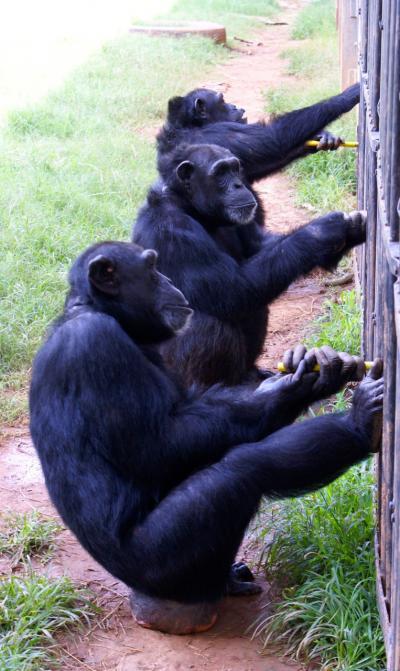The study apparatus required that one chimpanzee (in the dyadic condition) or two chimpanzees (in the triadic condition) remove a barrier in order for another chimpanzee to simultaneously pull in a tray baited with food. The apparatus was mounted to the outdoor enclosure, allowing the chimpanzees to come and go as they wanted within each one-hour session.
"That the chimpanzees preferentially approached the apparatus when kin or non-kin of similar rank were present shows a preference for socially tolerant partners, and this demonstrates that in the midst of a complex social environment, chimpanzees spontaneously initiate and maintain a high level of cooperative behavior," Suchak says.
"Because previous research could only elicit cooperation in a much more controlled setting, we thought more complex, cooperative behavior might have uniquely evolved in humans. This study demonstrates chimpanzees are more cooperative than we realized, and we've yet to fully explore the extent of the similarities between chimpanzee and human behavior in this regard," Suchak concludes.
Established in 1930, the Yerkes National Primate Research Center paved the way for what has become the National Institutes of Health-funded National Primate Research Center (NPRC) program. For more than eight decades, the Yerkes Research Center has been dedicated to conducting essential basic science and translational research to advance scientific understanding and to improve human health and well-being. Today, the Yerkes Research Center is one of only eight NPRCs. The center provides leadership, training and resources to foster scientific creativity, collaboration and discoveries, and research at the center is grounded in scientific integrity, expert knowledge, respect for colleagues, an open exchange of ideas and compassionate, quality animal care.
Yerkes-based research programs are seeking ways to: develop vaccines for infectious and noninfectious diseases; increase understanding of progressive illnesses, such as Parkinson's and Alzheimer's diseases, and develop methods for the earliest possible diagnosis; unlock the secrets of memory; treat and even prevent autism spectrum disorders, fear and anxiety-related disorders, and drug addiction; advance knowledge about the evolutionary links between biology and behavior; and interpret brain activity through imaging.

Chimpanzees spontaneously cooperate with multiple partners of their choosing to remove a barrier and pull in a tray baited with food.
(Photo Credit: Yerkes National Primate Research Center)

The study apparatus required that chimpanzees remove a barrier in order for another chimpanzee to simultaneously pull in a tray baited with food. The apparatus was mounted to the outdoor enclosure, allowing the chimpanzees to come and go as they wanted.
(Photo Credit: Yerkes National Primate Research Center)
Source: Emory Health Sciences